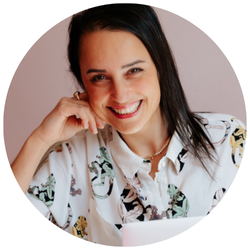Have you ever seen photos of the place where Virginia Woolf wrote many of her masterpieces?
It's a study in Yorkshire, a small room with a desk, a chair, an oil lamp, a bottle of water, newspapers, and notes.
It's not much different from the places we write nowadays. Many people don't have such a dedicated spot. Still, we have something to write on, something to drink, somewhere to sit, and something to light up the place (though no oil anymore).
There is one big difference, though: these days, we write on a laptop with a smartphone nearby.
This means that while we write in the physical world, sitting before a keyboard, we are also half in a different world, where people are talking, sharing, and commenting — even if they are not physically with us, they create tangible effects on our consciousness.
The difference, to put it simply, is that we live a digital life.

Chronic Information Overload
In addition to the things we encounter in our physical world, we are also constantly bombarded by an incredible amount of information from the digital world, such as emails, memes, texts, status updates, photos, videos, news, you name it.
Twenty years ago, information scientists estimated that an American was being exposed to information equal to 178 newspapers daily. That’s massive, right?
Today, that exposure has doubled.
And even if, at first glance, more seems better, especially when it comes to the availability of information, more actually means a significant erosion of our cognitive abilities.
To make sense of all this information, our brains need to filter it down, separating what's useful from what's not. This means making many minute decisions, which in turn means enormous cognitive costs.
In order to write, we must accomplish several different things, like staying still for a certain amount of time, not getting distracted, and generating new ideas. This is already a considerable effort on top of the monumental amount of information our brains are dealing with.
To make sense of all this information, our brains need to filter it down, separating what's useful from what's not. This means making many minute decisions, which in turn means enormous cognitive costs.
But it's not just about quantity.
Imagine living in a giant library full of books (one of my biggest dreams). That doesn’t sound bad. But now imagine those books coming alive and starting to attack you. You have to protect yourself while knowing that among the books you are trying to avoid, there are also books you need to live and thrive.
That’s the struggle your brain is going through in the modern world.
In other words: most information we receive nowadays is unrequired but we have to sort through it to find the information we need to live. Not only that, the unrequired information is also specifically designed to get through to our brains through the emergency path dedicated to vital information. (“10 Reasons You Need To Change Your Fabric Softener Now!”)
At the end of the day, the problem is this: being exposed to a massive amount of information puts us in constant information overload.
That’s something Virginia Woolf definitely didn’t have to deal with in the early twentieth century.
The Mental Price of Social Media
Of course, one of the most significant sources of information these days is social media.
Distractions from social media are the sneakiest. First, they hook our attention, carrying us away from the task at hand.
After that, many become internally rooted thoughts that we replay in our minds, affecting deeper levels of our being, like self-esteem, and strongly affecting mood and emotions.
Adding another layer, social media is constant, which generates a fear of missing out on something potentially relevant or important.
More Is Not More
As the Nobel-winning economist Herbert Simon predicted in 1977, "a wealth of information creates a poverty of attention."
Cognitive fatigue from filtering out, decision-making, and self-control management translate into body tiredness, fatigue, and anxiety.
That's why we should not overlook the role of information overload in our ability to focus, be productive, and especially to be creative.
Cognitive fatigue from filtering out, decision-making, and self-control management translate into body tiredness, fatigue, and anxiety.
The worst nightmare of every writer, Virginia Wolf included, used to be the empty mind of writer's block.
But in the digital era we find ourselves in, our minds are so full of information that an empty mind is almost desirable.





























